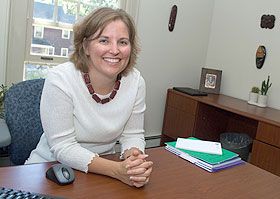  |
| HOME | THIS ISSUE | CALENDAR | GRANTS | BACK ISSUES | < BACK | NEXT > |
Liberal arts and sciences advising center welcomes new directorby Cindy Weiss - September 24, 2007 | ||||
| Katrina Higgins, the new director of the Academic Services Center in the College of Liberal Arts and Sciences, sits in her office beneath a still-life painting of fruit on a table. It is vaguely reminiscent of Gauguin, but the shadows cast by the fruit are askew. The painting tells a story about her job, overseeing academic advising for 12,000 liberal arts and sciences students. An economics major came to her in May of his senior year because he was missing the art appreciation or art history credit the College requires for graduation. They scoured the catalog, but nothing was available in the summer to make up the deficiency. Desperate, he found a studio art course in painting that was offered during the May intersession. “I was not really happy about it,” says Higgins, who makes the decisions that allow substitutions in required courses in CLAS, “but I said, ‘I’ll do it if you paint me something.’” She was kidding, but the student wasn’t. He walked in the graduation ceremony, took the painting course to officially complete his degree, and presented her with his oeuvre before heading to a job. CLAS oversees academic advising for undergraduates enrolled in the College – more than half UConn’s undergraduate population. Higgins, named director of the Academic Services Center earlier this month, has been an adviser since 2004 and was previously a residence hall director. A native of Australia, she has a Ph.D. in history from the University of Tasmania. The Center is located in a section of the dean’s office in a brown house at the end of Whitney Road. There, two to three advisers work with students, faculty, and the registrar’s office to make sure that CLAS students fulfill the requirements of whatever degree course they decide upon – in one of the College’s 40-plus majors or an individualized program. “Our primary charge is to resolve undergraduate issues,” Higgins says. “If there’s a piece of paper that needs the dean’s signature, we take care of that.” Sometimes the center’s advisers meet with students who discover at the 11th hour – like the economics major – that their graduation is in jeopardy because they haven’t met all the requirements. Advisers do their best to help such students, even though, says Higgins, they would prefer to see them the semester before graduation.
“If a student plans well enough,” she says, “they’ll always get what they need.” Another task for the advisers is to meet with the 150 to 200 students each semester who have recorded less than a 2.0 grade point average for two consecutive semesters. The advisers look through each transcript, and decide whether the student should be dismissed or remain at the University on scholastic probation. Increasingly, they try to help students make the most of their undergraduate years – earning Study Abroad credits, getting approvals for extra credit courses, or adding minors, a growing trend. They also work with transfer students seeking credit for courses taken elsewhere; with Connecticut community college students who are entering UConn under the Guaranteed Admissions Program; and with freshmen entering the College. “We’re really busy in the summer because of orientation,” Higgins says. The Center’s advisers see some 1,200 students at that time, both transfers and freshmen. From time to time there are unusual cases, like the businessman who had to leave one course short of his degree when his father died in 1982. Mark Kiniry, now senior vice president and central division sales manager for a Fortune Global 300 firm, e-mailed the University asking how he could finish his degree, 26 years after he left. Higgins responded and they mapped out a plan. He took that last course online this summer to complete his bachelor’s degree. “I attribute a lot to her helping me get it done,” he says. Kiniry’s daughter, a high school senior, is now considering coming to UConn. If she does, the CLAS Academic Services Center may be one of her first stops. |
| ADVANCE HOME UCONN HOME |

